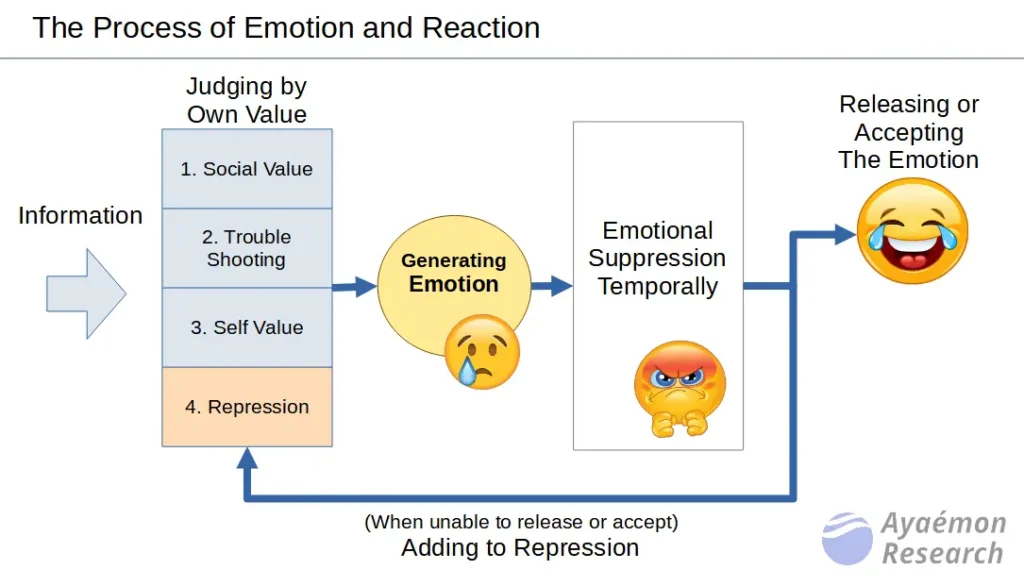Overview
Today is about psychology of emotion.
Today’s conclusion is that I recommend releasing our emotions when we come across a bad event. If so, we can change more easily.
One day of my childhood
I remember that that was a day from my childhood. That was dinner time for my family.
My mother belonged to some neighborhood club, so she had gone hiking or picnicking with them during that daytime. But she said that it had been terrible because one of the members had been complaining about something small in her daily life. So my mother felt the picnic was ruined.

When I heard that at the dinner table, I felt that “she is doing the same as the club mate.” Because she is ruining our family’s dinner time by spreading bad emotions.
So I determined that I would never spread my bad emotions around like that. That was a decision I made at a young age.
Expression or suppression
When we come across a bad event, I think that we usually want to share our bad emotions with those around us. Especially to a familiar person. Not only bad emotions but also good emotions, like glad, happiness, and so on.
Expressing good emotions is no problem. But I had thought that expressing bad emotions was bad behavior, because it makes our surroundings also feel bad.

But recently I understood that it’s better for us to express our emotions. Especially, for highly empathic people.
Because these emotional suppression keeps us stack in our current situation. In other words, the true bad thing is not knowing how to express itself.
So in today’s article, I’ll explain how emotional suppression works. If we knew this mental logic, we might be able to express our emotions more safely.
The process of emotion
To explain that, let’s take a look at our emotional process. (Image below)

Emotions are processed in four steps, as shown below.
- Judging it by our own value
- Generating emotions in order to react
- Suppressing the emotions temporarily to keep social manners
- If we get safety, we release or accept the emotions. If not, add it to our own values to avoid the event from now on.
How emotions are processed
Let me explain these 4 steps in more detail below.
Step 1: When we get some event or information, we judge it by our own value. We have several levels of values that contain repression.
Repression is the most important rules that we need to react immediately. In other words, this is the most subconscious rules we have learned from our childhood.

Step 2: Then we generate emotions in order to respond. For example, if it looks like it could be eliminated, we might feel anger in order to fight against it. If it looks unchangeable, we might feel sadness in order to release stress.
Suppressing emotions
Step 3: However, in many situations, we are unable to express the emotions immediately. Because social behavior is in demand. Or we could have our hesitations about expressing emotions.
So we tend to suppress our emotions temporarily.

Step 4: After we have found a safe place to express the emotions, we can release or accept the emotions.
If we cannot do that, the trigger event will be added to our repression. Because we cannot release the emotion. It means that we cannot release the stress caused by that event.
As a result, we will attempt to avoid these events subconsciously. This is a new repression rule that makes it more difficult to change our current situation.
Importance of releasing emotions
As mentioned above, I decided that I would never say the complaint in my young age. Actually, that is good for others. But recently I found that that had been bad for my mental health.
Releasing our emotions is important. That prevents us from making a lot of repressions.

So, how to express them. Maybe Expressing our emotions without blaming won’t be a bad feeling.
In other words, if we are honest with our emotions, it won’t be stressful to hear. Because our feelings are neither good nor bad. Judging is stressful for highly empathic people.
Furthermore, we might release these emotions by other safety ways. For example, writing it in our diary, talking to our inner mind, and so on.
Summary
So I think the emotional suppression is not good for our mental health. Maybe it keeps us stacking in our current situation.
It’s the problem of how to release our emotions. Especially, when we want to change.

When we know this mental logic, we might be able to use our mind more efficiently and change our situations.
Thank you for reading, see you in the next article.


